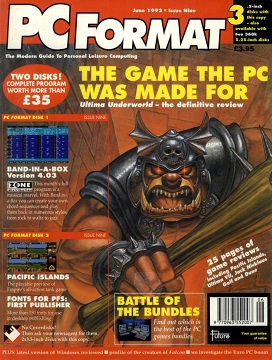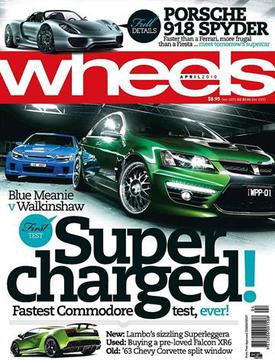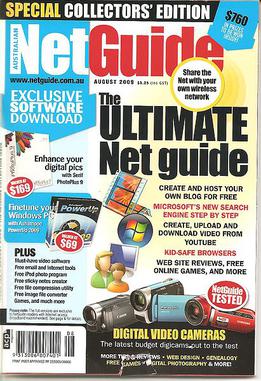
ZDNET is a business technology news website owned and operated by Ziff Davis. The brand was founded on April 1, 1991, as a general interest technology portal from Ziff Davis and evolved into an enterprise IT-focused online publication. After being under the ownership of CNET Networks (2000–2008), CBS Corporation (2008–2020), and Red Ventures (2020–2024), ZDNET was reacquired by Ziff Davis in August 2024. CNET was included in the acquisition as well.

Maximum PC, formerly known as boot, is an American magazine and website published by Future US. It focuses on cutting-edge PC hardware, with an emphasis on product reviews, step-by-step tutorials, and in-depth technical briefs. Component coverage areas include CPUs, motherboards, core-logic chipsets, memory, videocards, mechanical hard drives, solid-state drives, optical drives, cases, component cooling, and anything else to do with recent tech news. Additional hardware coverage is directed at smartphones, tablet computers, cameras and other consumer electronic devices that interface with consumer PCs. Software coverage focuses on games, anti-virus suites, content-editing programs, and other consumer-level applications.

The Australian Women's Weekly, sometimes known simply as The Weekly, is an Australian monthly women's magazine published by Are Media in Sydney and founded in 1933. For many years it was the number one magazine in Australia before being outsold by the Australian edition of Better Homes and Gardens in 2014. As of February 2019, The Weekly has overtaken Better Homes and Gardens again, coming out on top as Australia's most read magazine. The magazine invested in the 2020 film I Am Woman about Helen Reddy, singer and feminist icon.

PC Format was a computer magazine published in the United Kingdom by Future plc, and licensed to other publishers in countries around the world. In publication between 1991 and 2015, it was part of Future plc's Format series of magazines that include articles about games, entertainment and how to get the most out of the platform. Despite the occasional mention of alternatives, PC Format takes the term 'PC' to mean a Microsoft Windows-based computer.

Wheels is an Australian automotive magazine owned by Motoring Media Network. The publication is well-renowned by Australian car enthusiasts. Its main competitor within the Australian car magazine market was Motor, though Wheels and Motor were stablemates in the Bauer Media Group catalogue and were aimed at slightly different readers as Motor put more attention on performance cars. Wheels magazine is sold in Australia and New Zealand through online delivery and some retail stores. The magazine was published monthly by Bauer Media before Bauer sold its Australian media interests to Are Media in June 2020. Wheels was sold to Motoring Media Network in July 2024.

PC Magazine is an American computer magazine published by Ziff Davis. A print edition was published from 1982 to January 2009. Publication of online editions started in late 1994 and continues as of 2024.

Atomic once was a monthly Australian magazine and online community that focused on computing and technology, with a great emphasis on gaming, modding and computer hardware. Atomic was marketed at technology enthusiasts and covered topics that were not normally found in mainstream PC publications, including video card and CPU overclocking, Windows registry tweaking, and programming. The magazine's strapline was 'Maximum Power Computing', reflecting the broad nature of its technology content.

Hyper was a multi-platform Australian video game magazine. It was Australia's longest running gaming magazine, published from 1993 to 2019.

Custom PC was a UK-based computer magazine originally published by Dennis Publishing Ltd and subsequently sold to Raspberry Pi Trading Ltd. It was aimed at PC hardware enthusiasts, covering topics such as modding, overclocking, and PC gaming. The first issue was released in October 2003 and it was published monthly until the final issue, number 235, was released in February 2023.
bit-tech is an online magazine for computer hardware enthusiasts, gamers and case modders, based in the UK. It was founded in 2000, became a fully professional online publication in 2005, and announced its acquisition by Dennis Publishing in October 2008. Dennis Publishing then partnered the site with existing monthly publication Custom PC magazine, making Bit-Tech the online version of the magazine. At this point the two editorial teams were totally integrated. However, due to a restructure in January 2012 the website and magazine had separate editors again, although several of the writers still contributed material to both publications. It is owned by The Media Team.

Australian NetGuide was originally established in Australia by OzEmail as that Internet service provider's member publication.

PC Plus was a computer magazine published monthly from 1986 until September 2012 in the UK by Future plc. The magazine was aimed at intermediate to advanced PC users, computer professionals and enthusiasts. The magazine was specifically for users of PCs and related technologies so features articles were undiluted by coverage of other platforms. It began its life specifically as a magazine aimed at the Amstrad PC user.

APC is a computer magazine in Australia. It is published monthly and comes with a cover-mounted DVD of software. It is published by Future Australia.

Computer Shopper was a monthly consumer computer magazine published by SX2 Media Labs. The magazine ceased print publication in April 2009. The website was closed and redirected to the PCMag website in late May 2018.

Smart Computing was a monthly computing and technology magazine published by Sandhills Publishing Company in Lincoln, Nebraska, USA. First released under the name PC Novice, it was published from 1990 to 2013.
PC Live! was a digital lifestyle magazine from the Republic of Ireland edited and produced by the publishing company Mediateam in Dublin.

Woman's Day is an Australian women's magazine published by Are Media. It is one of Australia's most widely read weekly magazines as of June 2023.

Byte was a microcomputer magazine, influential in the late 1970s and throughout the 1980s because of its wide-ranging editorial coverage.
NetGuide is a live news website with weekly email newsletters dedicated to New Zealand consumers, covering technology news, product reviews and buying advice. Netguide.co is the largest site in the Techday network.


















